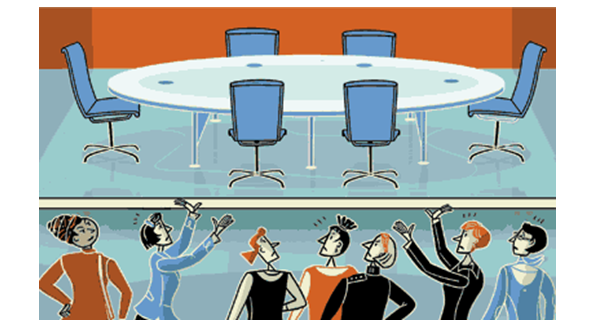[Brussels, 18 April 2014] Last week the Social Platform, which is the largest civil society alliance fighting for social justice and participatory democracy in Europe, published its position paper on employment: “How to make labour markets inclusive”. The European Women´s Lobby (EWL) is one of the Social Platform´s 47 pan-European networks working to promote social justice, equality and participatory democracy within Europe and in particular the European Union (EU).
The Social Platform’s paper looks at the issue of employment from a comprehensive perspective, addressing five main issues: accessible labour markets, creation of jobs, quality employment, progression in employment and civil dialogue for employment policies.
Following the economic crisis, the European focus has been on economic growth. At the same time, unemployment has been rising and according to the Social Platform`s position paper, nearly one-fourth of the EU population are experiencing poverty or social inclusion. The International Labour Organisation (ILO) has pointed out that low-skilled workers and female workers are among those most hit by the crisis. Temporary contracts, part-time work and inadequate wages have become characteristic in the EU.
This is all damaging a proper work-life balance and impacting on gender equality and social protection rights creating a liquid labour-market, where job security is minimised in order to have a workforce that is as flexible as possible.
Therefore, the Social Platform is calling for an investment in the creation of and equal access to quality and sustainable employment. Every person has the right to quality employment and a decent wage. The ones excluded from the labour market, should be supported in their right to work. Labour markets that are accessible for all women and men that can work will not only benefit the society but the economy as well.
Many people face discrimination already when trying to access the labour market, therefore the position paper remarks that social inclusion and employment must be addressed from a rights-based perspective: investments in job creation are only effective and sustainable if the quality and sustainability of employment is guaranteed. The jobs created need to be appropriate for people with lower skills and accessible to people most excluded by the labour market. Investment in quality and sustainable employment will decrease in-work poverty, gender pay gap and labour market segmentation.
Once in employment many people still face exclusion. Often this is a result of having to reconcile care responsibilities with professional life, lacking access to adequate training, or discrimination on the basis of gender, age, parenthood, ethnic background, sexual orientation or disability. As we are facing the difficult economic climate in Europe with governments cutting on social and healthcare benefits, we need to pay more attention on the crisis` effect on the most vulnerable. The European Women´s Lobby has addressed its concern about the effect that the cuts and austerity programs have on women, because women are more relied on public services than men.
Furthermore, the inequalities within the labour market can be seen as women and other minorities are still often facing the glass-ceiling when they are trying to build up career. Glass-ceiling effect can be defined as an unseen barrier that keeps women and minorities from rising up in their career regardless of their achievements and qualifications. This means that there are apparent inequalities occurring in the workplace.
For the EWL, ensuring women’s economic independence is key to the promotion of gender equality. This includes:
1) integrating strong gender equality dimension into European employment, poverty and social policies;
2) working towards the elimination of sex-based discrimination in employment and pay;
3) making the link between paid and unpaid work and;
4) ensuring accessible and affordable care services.
The economic decisions have a huge impact on people’s everyday life and well-being. The European Semester, which is the driving decision-making process of the Europe 2020 Strategy, currently only concentrates on how to reduce deficits and thereby budgets without an impact assessment on women, men and vulnerable groups. Therefore the EWL calls for the engagement of civil society in economic decision-making in order to tackle the rising poverty and inequalities in Europe. This is part of EWL’s demands for the European elections 2014; read here our Manifesto.



